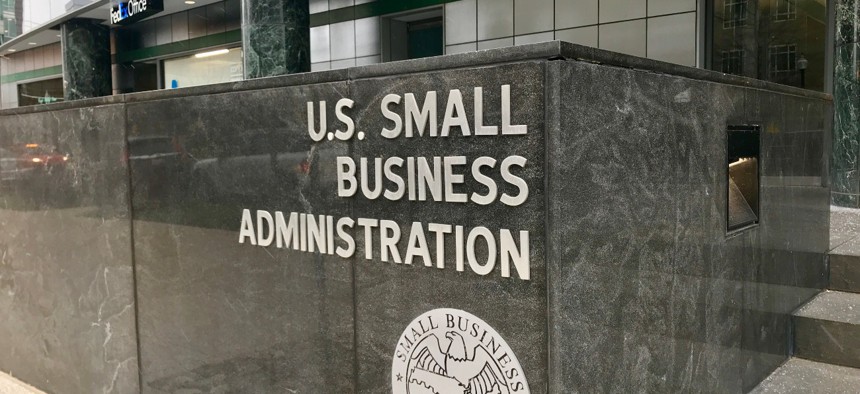
By Jer123 / Shutterstock.com
Watchdogs Tackling Tens of Thousands of Fraud Allegations as Feds Disburse COVID Relief Funds: 'It's All Hands on Deck'
They warn, however, that SBA’s lack of cooperation is "an extreme situation."
The Small Business Administration remains at risk for widespread fraud as it doles out relief funds and begins the process of forgiving loans related to the novel coronavirus pandemic, two auditors said on Thursday, and the agency is going to “extreme” measures to prevent proper oversight.
Onlookers have flagged tens of thousands of allegations of fraud related to the $669 billion Paycheck Protection Program and other initiatives Congress authorized in response to the economic downturn caused by COVID-19, SBA Inspector General Mike Ware told lawmakers, and the watchdog has launched hundreds of investigations. SBA oversaw a chaotic rollout to the unprecedented PPP, and Ware said the rush to get the relief dollars out the door widened opportunities for fraudulent activities.
“They removed guardrails,” Ware told the House Small Business Committee, adding the agency “weakened controls.” SBA’s actions “increased the fraud risk significantly,” he said. “They have that balance to deal with, but one part of that balance act cannot be sacrificed for the other.”
Already, Ware said, the need to get the money intended for businesses forced to shut down out so quickly “left a lot of things to be missed.” He praised the Justice Department for taking swift action, already bringing charges against dozens of individuals. He added that several agencies across government are involved with the oversight efforts, as none of them have the capacity to handle the workload on their own.
“This has been an all hands on deck approach to oversight because none of us could handle this alone due to the magnitude of what we are handling,” Ware said.
The IG recently told Rep. Gerry Connolly, D-Va., he could not launch an investigation to ensure SBA is safely bringing back employees to their normal workstations as his office is too busy providing COVID-19 relief oversight. He described a whack-a-mole environment in which investigators are constantly responding to new threats as bad actors evolve, but pledged to continue identifying wrongdoing.
“Fraudsters are going to do what fraudsters are going to do,” Ware said. “We have to continue to meet with the agency when we find new schemes so they can pivot quickly to mitigate a lot of the risk and shore up a lot of controls.”
While the IG said SBA has been “pretty responsive” to those efforts, William Shear, the financial markets and community investment director at the Government Accountability Office, criticized SBA for dragging its feet in providing information.
“There was obstruction when we were trying to obtain loan-level PPP data,” Shear said. “That went on for weeks. Getting access to people to talk about how they were implementing PPP, that went on for weeks.”
He added that SBA is still resisting efforts to provide “very straightforward information,” and suggested the head of GAO, Comptroller General Gene Dodaro, may soon get involved as the auditors elevate their tactics to solicit cooperation.
“We’re close to being at the stage where you might be hearing from the comptroller general again,” Shear said. “The administrator of SBA might be hearing from the comptroller general again. Our general counsel will be reaching out to the general counsel at SBA. It is an extreme situation.”
SBA has 90 days after lenders submit applications for loan forgiveness to approve them, but lawmakers at the hearing were skeptical the agency would meet that deadline. Shear said SBA could likely do so, but it could again lead to tipping the scale away from oversight.
“The question is whether it will protect the integrity of the program in how they go about it,” he said.
Ware praised the efforts of SBA’s employees, saying they worked “long and hard” to get money to those who needed it. Ultimately, however, he conceded their efforts were not flawless.
“There is no doubt that there is a large part that have gone to ineligible and fraudulent recipients,” the IG said.







